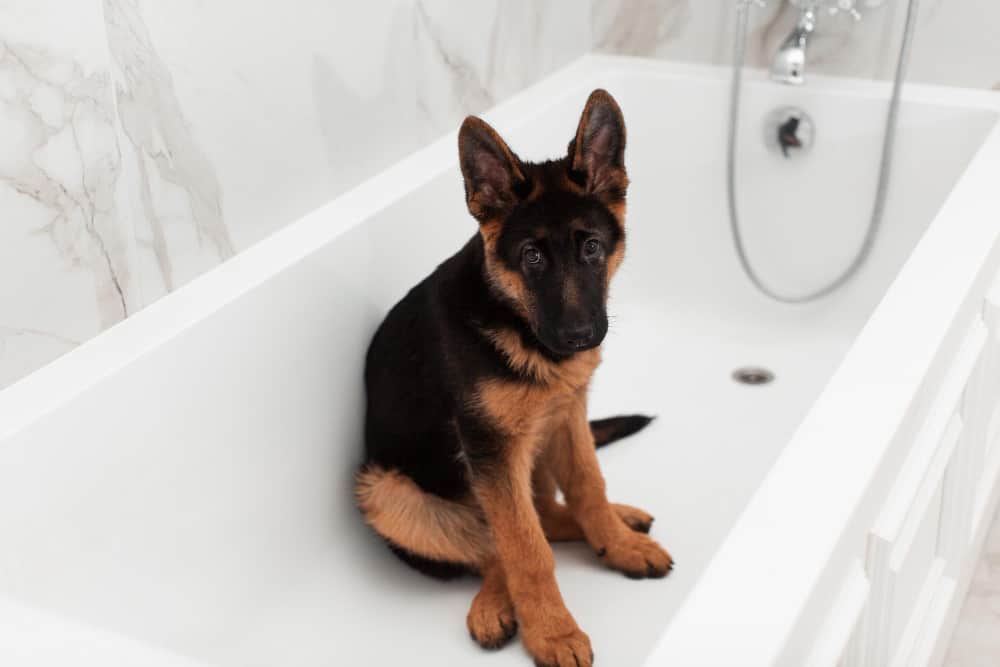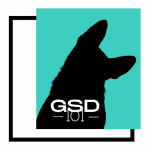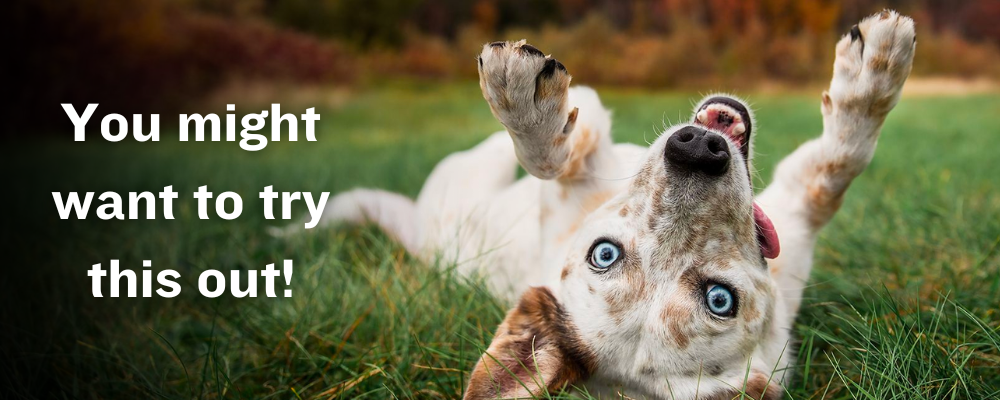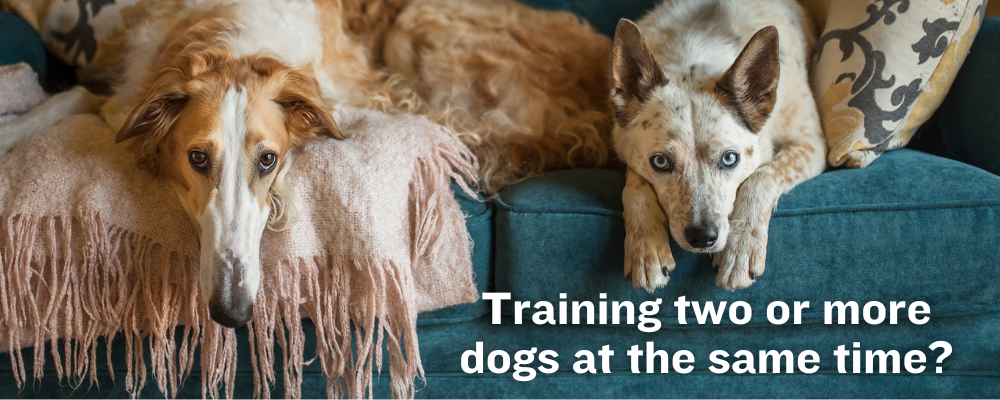German shepherd puppies are energetic, smart and curious about the world around them. These dogs love human interaction and need positive experiences to thrive. Socialization helps your German Shepherd puppy grow into an adult dog who is comfortable in new situations.
Socialization is all about exposing a puppy to different experiences, including but not limited to different people, animals, environments, sounds, surfaces, or objects. A well-socialized German Shepherd puppy will grow up to be incredibly well-behaved and socially accepted with well-channelized instincts.
So how do you socialize with a German Shepherd puppy? It’s not difficult but requires some time and patience. This article will introduce you to everything you need to know on how to socialize a German Shepherd puppy.
Puppy socialization explained
In essence, socialization helps them learn what to expect from the world around them and gives them the tools they need to navigate it as they get older.
Socialization is the process of introducing a puppy to different people, places, and things while they’re still young. This includes new people, dogs, and animals, learning how to interact with new environments, and being exposed to a wide variety of sounds, smells, and sights.
Puppies that are well-socialized are more likely to be healthy, obedient pets that make great additions to any household.
All of these things help build a dog’s confidence and prepare them for life as an adult.
The importance of socializing a GSD puppy
Socialization is an important part of dog ownership.
It helps your dog adjust to different situations and learn how to behave appropriately in various environments.
Start Early
Socialization is especially important during the first few months of a puppy’s life.
During this time, they’re most susceptible to learning new behaviors and forming lasting impressions of the world around them. This means that every interaction they have with their environment can have a significant impact on their development as a dog.
For example, if they’re exposed to a variety of new sights, sounds and smells during this time, they’ll be more likely to grow up into well-adjusted dogs that are comfortable in most situations.
Keep it positive
While exposing your strong-willed GSD to a stimulus for the first time, always remember to keep things ultra-positive, encourage curiosity and allow plenty of space and time. Be sensitive to your puppy’s needs and never force him to interact with something he’s not comfortable with.
When should I start socializing my GSD puppy?
Your German Shepherd Puppy is at the critical socialization phase during the first three months of their life.
This is when they are like sponges and are most open to new experiences. The exposure your puppy will get during this period will decide the kind of dog he will grow up to be and can also prevent possible behavioral issues in the future.
The potential problems of an under-socialized German Shepherd Dog
An under-socialized dog may become anxious or distressed when left alone, and it may bark excessively or chew furniture. It may not be well-behaved around other dogs and it could bite someone if it feels threatened.
As a result, an under-socialized dog can be a nuisance and difficult to manage, and they are more likely to develop undesirable behaviors in the future, such as excessive barking or aggression towards other dogs and people.
Socializing a GSD puppy at an early age will help your puppy display calmness as a response to novelty, which is of utmost importance in social situations.
The ultimate socialization checklist
The ultimate goal of “puppy socialization” is to get your German Shepherd puppy as comfortable and accustomed to the world around him as possible. While introducing your pup to a new stimulus, remember to –
– Reward frequently for good behavior
– Avoid overstimulation
– Keep hyper behavior in check by taking frequent breaks
– Give your puppy a choice to back off in case of discomfort
– Always end on a positive note
#1 Socialize your German Shepherd puppy on different surfaces
While introducing your puppy to new surfaces, ensure ease and safety. The surface shouldn’t be too hot or too cold; be cautious on slippery surfaces to avoid accidents.
If your dog is unwilling to step onto a certain surface, use treats and toys to encourage movement and have your dog on a leash.
Puppies can be apprehensive of certain surfaces like metal. Take it slow, ensure repeated, positive exposure and never force or drag your puppy. Here’s a list of a few surfaces you ca begin with:
- Pavement
- Variety of flooring (marble, wood, tile, etc)
- Wet surfaces
- Mud
- Sand
- Grass
- Rocky terrains
- Metal
- Carpets and rugs
- Moving surfaces (elevators and escalators)
#2 Socialize your German Shepherd puppy with different people
The next step in socialization is introducing your puppy to as many different people as possible.
There are a few reasons for this. First, it helps your puppy learn how to interact with people of all kinds. Second, it helps build confidence in your puppy by letting him know that all people are safe and friendly. Third, it helps your puppy learn how to behave appropriately around people.
This will help your pup form a positive association with people. Start with family members and close friends, and then expand to acquaintances and strangers. It’s important to expose your puppy to a variety of people, such as:
- People of all body types, heights, ages, and ethnicities
- Kids (babies, toddlers, young children)
- People wearing hats, jackets, bags, coats, sunglasses, masks, etc.
- People of all ethnicities
- People on wheelchairs and crutches
- People in crowd
- People walking, running, skating, jumping, jogging, etc.
#3 Socialize your German Shepherd puppy with different animals objects
When you bring your puppy home, everything is new to him and he is new to everything. Your puppy will react differently to different objects depending on its sound, sight, texture, or movement.
Some may spark curiosity, some may intimidate your pup while he may be just indifferent to a lot many. Let your puppy be the first one to approach an object and give him time to get comfortable with these objects below:
- Vehicles
- Gardening tools
- Trash cans
- Vacuum
- Brooms and mops
- Shovels
- Shoes, clothes, accessories, bags
- Shopping carts
- Skates and skateboards
- Sporting equipment (bats, hockey sticks, etc)
#4 Socialize your German Shepherd puppy with different animals
A German Shepherd’s chasing instincts will peak when interacting with other animals, especially smaller ones.
Unless you decide to raise a hunting dog, it would be advisable to keep these instincts under check by always having a leash on your pup.
Training and mastering impulse control cues like Stay or Leave and repeatedly exposing your dog to a variety of animals like:
- Dogs – small, medium, large, puppies, or senior dogs
- Cats
- Cattle
- Smaller animals – Bunnies, rats, squirrels, ducks, geese, etc.
- Horses
- Any other animal that your pup may encounter in their day to day life
#5 Socialize your German Shepherd puppy with different sounds
German Shepherds are commonly known to have sound sensitivity. This can be a huge hindrance especially when they are being trained for specific purposes.
Exposing your puppy to a variety of sounds must be prioritized while socializing them. Consider starting with low volumes and train your way up.
Depending on the kind of lifestyle you’d be living with your dog, you can tweak your puppy’s sound exposure accordingly. If you plan on living a quiet suburban lifestyle, subject your pup to daily, mundane sounds and noises.
However, if you live in a busy city, accustom your puppy to the city life, including but not limited to the sound of:
- Vacuum
- Heavy machinery
- Drill, hammer and other hardware sounds
- Vehicles driving and honking (cars, motorbikes, tractors, trucks, etc)
- Sirens
- Fireworks
- Hairdryer
- Lawnmower
- Barking dogs
- Loud Music
#6 Socialize your German Shepherd puppy in different environments
While introducing your GSD to various environments, try not to overwhelm him. The chances of overstimulation are high in crowded environments like marketplaces and subways where too many things and events keep taking place simultaneously.
Limit your puppy’s exposure to such places to only a few times a week and keep the sessions short. Do take your puppy out to less stimulating places like parks, sidewalks, etc every now and then to raise them to be confident and calm in these environments.
Here’s a quick list of environments to consider:
- Market places
- Retail stores
- Metro station
- Parks
- School
- Puppy classes
- Bridges
- Parties and social events
- Hospitals
- Vet
- Grooming salon
- Moving vehicles
- Water bodies (lake, river, beach)
- Trails and hikes
- Staircases
- Restaurants
- Workplaces
- Playgrounds
- Tunnels
- Construction sites
- House painting
- Pet stores
#7 Socialize your German Shepherd puppy with different grooming and handling
It may sound silly to be reminded that your puppy needs to be comfortable with being touched by people.
However, it is important because your puppy will react very differently to you grooming them vs a complete stranger doing the same thing.
Right from a very young age, subject your pup to a lot of positive grooming and handling by people he doesn’t interact with on a daily basis in order for him to grow up to be super comfortable with such experiences. Here are a few examples:
- Kids playing and petting
- Mild roughhousing
- Brushing
- Ear, eye and teeth cleaning
- Nail clipping
- Bathing and drying
- Wearing and removing clothes, collars, harnesses, leashes, etc
Tips to properly socialize a GSD puppy
- Keep your puppy under the threshold
Keeping a puppy under a threshold implies not letting the pup reach a point of negative responses like barking, covering, lunging, etc. at the sight of a stimulus. This is vital while getting a pup to be comfortable around novelty.
- Keep it positive
You must keep rewarding your GSD puppy at every step of socialization in order to create positive associations. Rewards may include high-value treats, toys, verbal and physical praise, freedom to explore etc.
- Encourage play and curiosity
Playing increases the release of oxytocin in dogs, which is linked to a positive emotional response. This improves a dog’s ability to quickly be comfortable in new situations and around new people and animals. Encourage your puppy to play as much as possible.
- Never force your GSD puppy to interact with an uncomfortable stimulus (30)
Your dog will select either of “Flight or Fight” responses when in conflict. Forcing your pup to interact with a stimulus will block out the ‘Flight’ option for him, forcing him to Fight in the form of growling, barking, snapping and biting.
- Ensure repeated exposure (30)
Your puppy will need to be exposed to a certain stimulus at least 3 times in a positive way in order to be comfortable with it.
- Reward quick recoveries (30)
Instead of coddling your puppy at every whine, consider rewarding them with a ton of praise and treats when they choose to recover from a scary experience by continuing to sniff/ explore and play.
How to socialize a shy puppy?
A shy dog will take longer to get comfortable in any given scenario as compared to an outgoing pup. Remember the following tips while socializing a timid pup –
- Let your shy GSD be the first one to approach
- If your puppy is scared of something specific, eg, kids, don’t crowd him in a kids’ park. Introduce one calm kid at a time
- Encourage sniffing, exploring and playing
- Keep sessions short
- If your puppy is stressed, remove him from the situation before it gets worse
How to socialize an older GSD?
An older German Shepherd especially past the age of 3 to 4 years, is set in his own ways. His response to triggers is a product of his age, genes, past experiences, prior training and environment.
Instead of completely changing the dog’s personality, you must focus on giving your dog the choice to keep their distance from his triggers.
For example, a 5-year-old GSD that is fearful of other dogs cannot come around to loving other dogs. Hence, we must learn to respect that and let our dogs choose to stay away.
In case of severe reactivity and aggression towards certain triggers, you may need help from a professional.
Conclusion
Puppy socialization is a vital experience each and every puppy must-have for an enriching life. By just taking some time off your schedule every week and at almost no extra cost, you can fulfill your German Shepherd’s sense of curiosity, enrich their existence, improve their physical and mental health and build an incredible bond.
FAQ
How long should I socialize my GSD per day?
Your puppy is socializing every minute of the day, whether you know it or not. Depending on the kind of day your puppy has had or is having, tweak his socialization duration and experiences to match his energy levels and state of mind, starting with a few minutes, up to an hour max outdoors.
Some experiences are deliberate and supervised, while most of them keep happening even when you’re not looking, like sniffing surfaces, interacting with new objects, hearing various sounds, seeing new faces day in and day out, and experiencing different events around them, etc.
How do I know if I am socializing my GSD right?
When around a stimulus, if your puppy is calm, relaxed, playful, food motivated and curious, rest assured that he is doing well.
If he has started to growl, bark, hide, crouch, or is struggling to calm down, he may be overstimulated or uncomfortable in that particular setting.
Is puppy training class good for socialization?
Puppy training classes are an amazing way to not only socialize your German Shepherd to a variety of dogs and people, but also train him to be calm and more focused around them.
More posts on German Shepherd Puppies

Recommended post
German Shepherd Puppy – The Ultimate New Owner’s Manual
Health and care
- German Shepherd Puppies: Everything You Need to Know
- Bringing Your German Shepherd Puppy Home for the First Time
- How Much Does A Purebred German Shepherd Puppy Cost?
- $500 German Shepherd Puppy For Sale: Does it Make Sense?
- German Shepherd Puppy Crying: Owner’s Guide
- How to Stop GSD Puppies From Biting: 7 Owners-Proven Tips That Work
- When Will My German Shepherd Puppy’s Ears Fully Stand Up?
- German Shepherd Puppy Sleeping Guide: Everything You Need To Know
Training, socialization, and behavior
- 10 Best Training Tips for German Shepherd Puppy
- German Shepherd Puppy Socialization: A Beginner’s Guide
- How To Tell If a German Shepherd Puppy Is Aggressive
Feeding



